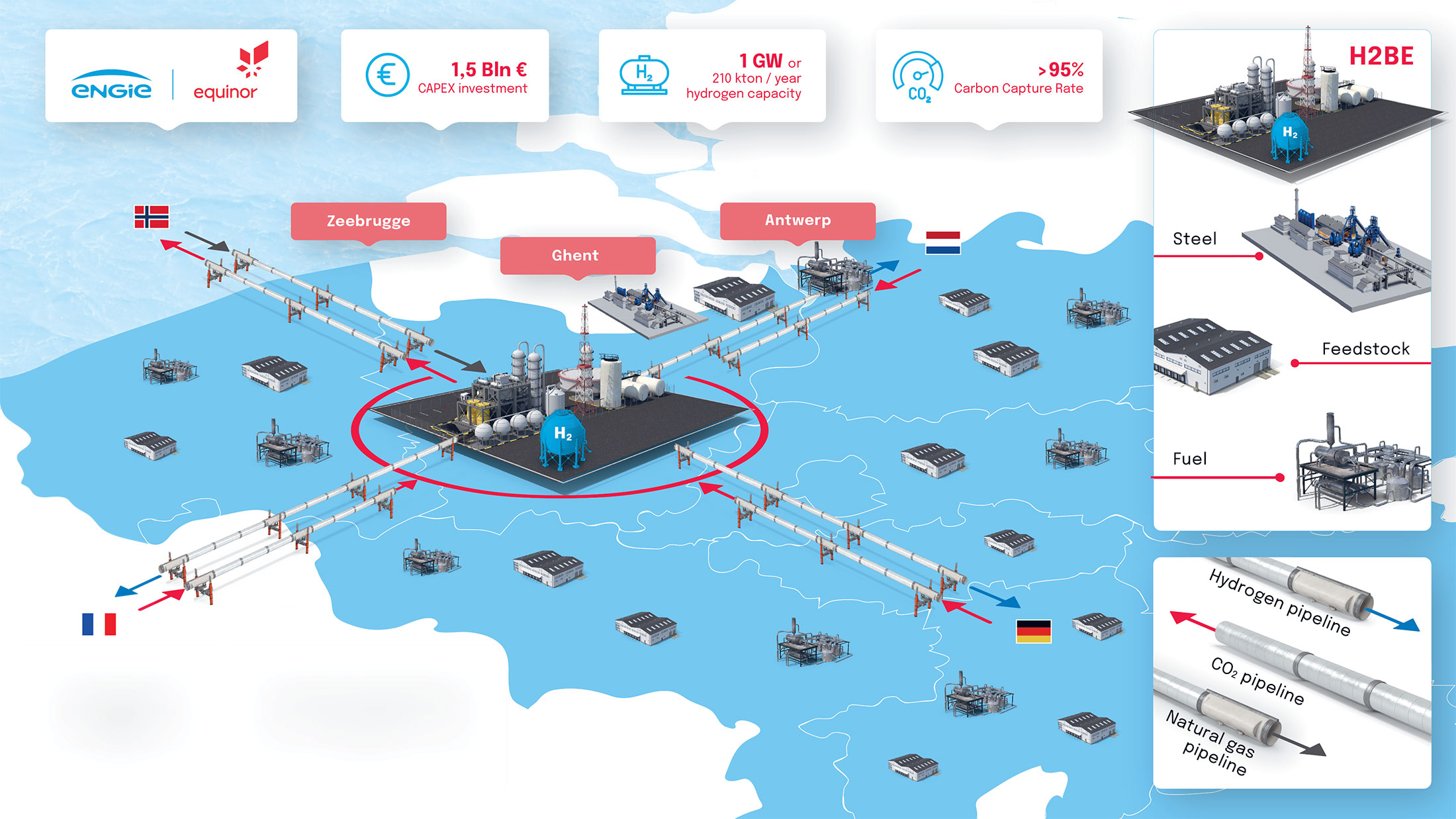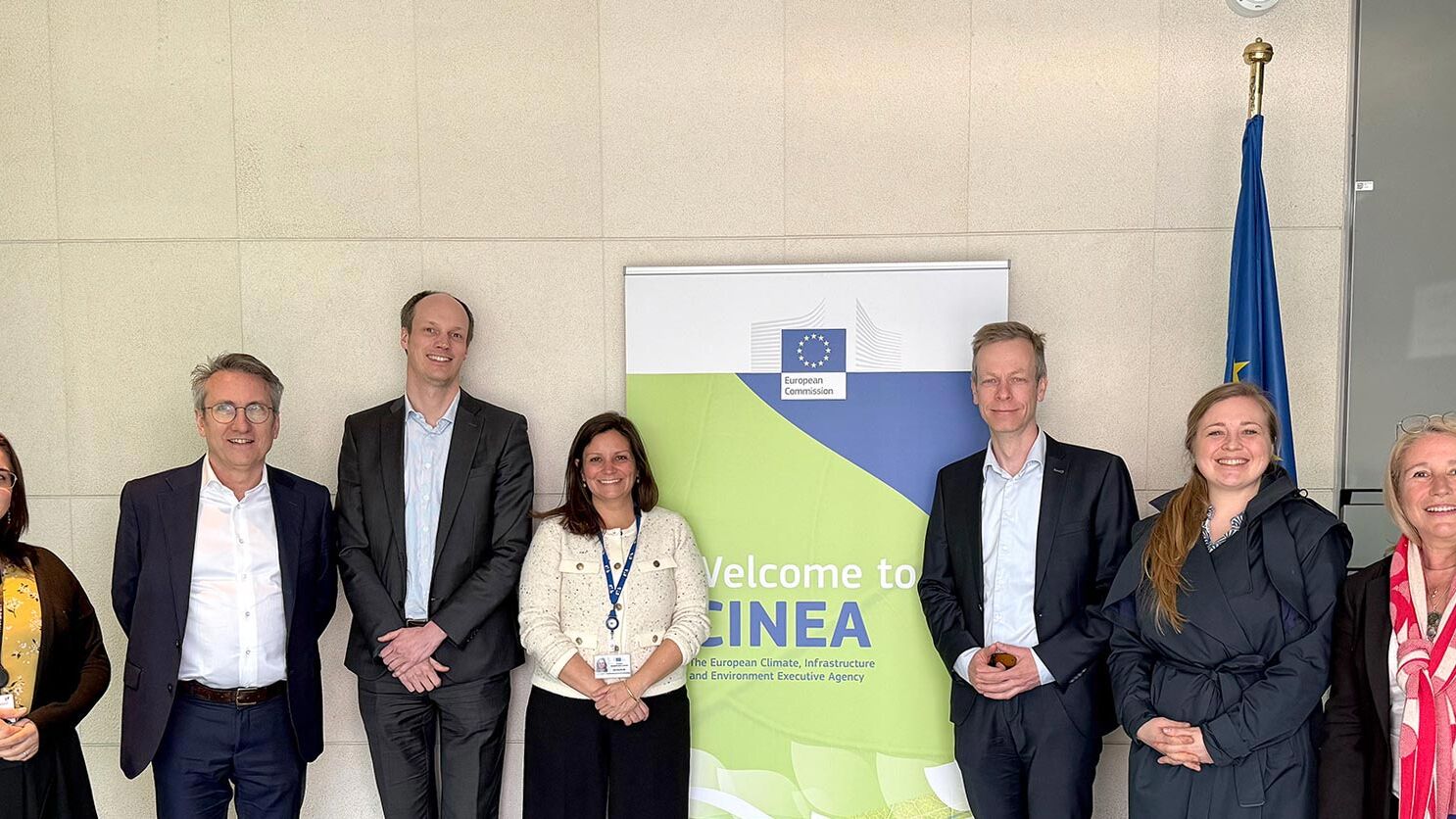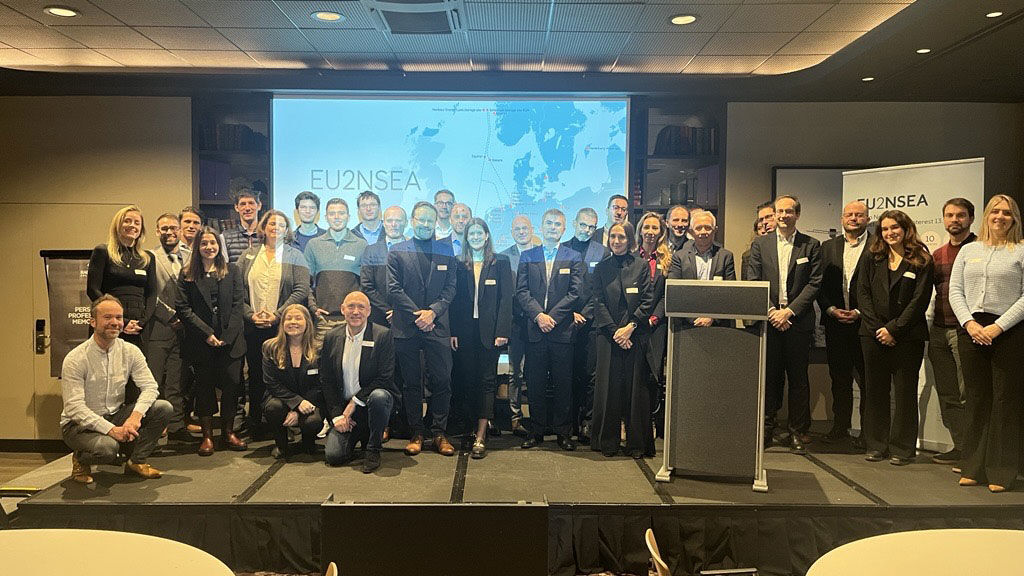H2BE actively contributes towards climate neutrality
H2BE offers the opportunity to future-proof local industries
With H2BE, ENGIE and Equinor aim to develop the production of low-carbon hydrogen from natural gas in Belgium.
How it works
With H2BE, ENGIE and Equinor aim to develop the productionof low-carbon hydrogen from natural gas in Belgium.
Both companies decided to jointly explore the market potential for the large-scale production of hydrogen from natural gas using
the auto-thermal reforming (ATR) technology combined with carbon capture and storage (CCS).

1 GW low-carbon facility will be capable of producing 210 kilotons of hydrogen every year
The ATR technology allows for decarbonization rates above 95% and for producing hydrogen at large scale at competitive cost levels.
A key aspect of its strategy involves transporting and storing the captured CO2 in the Norwegian Continental Shelf in partnership with Fluxys.
1GW
low-carbon hydrogen facility
210
Production of low-carbon hydrogen:
over 210 kilotons/year
95%
Carbon capture rate above 95%
1,7
Reduction of 1,7 Mton of CO2 per year on average for H2BE offtakers
Our goals
Given Belgium’s limited renewable energy potential, alternative low-carbon energy sources are needed to decarbonize its economy. The H2BE project in Flanders is pivotal for safeguarding the competitive position of Belgian companies and reinforcing Belgium’s role as a multi-energy hub. With engaged offtakers, H2BE plays a structural role in the decarbonization of hard-to-abate sectors such as steel and chemical which currently represent 54.000 jobs. Therefore, supporting H2BE not only strengthens our industrial competitiveness but also preserves crucial jobs and future welfare.
Investing in H2BE extends beyond its immediate economic growth of €630 million per year, as it accelerates the entire clean hydrogen economy by kickstarting the hydrogen and CO2 value chains. As a driver for economic growth, H2BE is positioned to establish a local hydrogen economy of €2,1 billion per year in 2030. Moreover, H2BE triggers the creation of 7.500 new jobs in the Belgian hydrogen economy (600 direct, 3.000 indirect, 3.900 induced) of which 90% permanent, highlighting its long-term contribution to the Flemish/Belgian economy.
This initiative plays a crucial role in laying the foundation for a sustainable hydrogen landscape. It actively contributes to the structural advancement of domestically produced low-carbon hydrogen by ensuring timely investments in local infrastructure, paving the way for a future dominated by renewable hydrogen. The project distinguishes itself by offering affordable low-carbon hydrogen volumes precisely when needed, particularly during the initial stages of the emerging hydrogen economy. The ability to scale up rapidly positions H2BE as a low-risk, high-impact local driver, essential for efficiently decarbonizing hard-to-abate sectors. Finally, H2BE can play a pivotal role in advancing knowledge on low-carbon hydrogen and CO2 value chain technologies. By contributing to these domains, the project positions Belgium as a leader in the low-carbon hydrogen sector.
Financial support for low-carbon hydrogen volumes of H2BE represents a cost-efficient intervention to mitigate CO2 emissions in Belgian industries. The project offers a compelling economic advantage, with its volumes providing a cost-efficient means to reduce CO2 emissions at one-third to one-fourth of the support needed for a similar-sized renewable hydrogen (import) project in 2030. H2BE thus emerges as a financially impactful strategy for achieving substantial emission reductions in industry. The H2BE project operates as a substitution for natural gas rather than an addition. Low-carbon hydrogen derived from natural gas is anticipated to exhibit lower volatility due to the expected evolution of feedstock costs and the established infrastructure of a mature market. Moreover, the project strategically aligns with ETS market dynamics as CO2 prices are expected to rise, enhancing the willingness-to-pay of hydrogen offtakers and consequently reducing the need for additional support
The strategic location of H2BE’s local production in the immediate vicinity of its offtakers is a key factor in guaranteeing the reliability of sufficient volumes at predictable prices by eliminating logistical uncertainties. H2BE’s localized production fosters an integrated local value chain of hydrogen and CO2. On top of that, the project’s collaboration with Norway, a trusted partner in Europe for both the supply of natural gas and the storage of captured CO2 in the North Sea, adds an additional layer of reliability. This partnership not only enhances the project’s resilience but also mitigates the risks associated with geopolitical developments overseas. Additionally, the maturity of H2BE’s ATR (Autothermal Reforming) technology further solidifies the project’s trustworthiness, providing a proven and well-established method for consistent low-carbon hydrogen production in Flanders.
H2BE actively contributes to CO2 reduction targets: with a carbon capture rate above 95%, the project structurally contributes towards climate neutrality, reducing on average 1,7 Mton of CO2 per year at H2BE offtakers. H2BE plays a pivotal role in achieving Belgium’s climate goals by delivering up to 12% of the emission reduction targets for 2030 in the ETS sector. The support needed for H2BE is one-third to one-fourth of that needed for a similar-sized renewable hydrogen (import) project. Importantly, even when considering a comprehensive LCA, the carbon footprint of H2BE (<1,5 kg CO2e/kg) remains competitive.
Furthermore, H2BE’s deployment of mature technology comes with an added environmental benefit as it doesn’t rely on the use of critical materials such as rare earth metals. The project’s commitment to sustainability even extends into the future: designing the facility to potentially use bio-methane instead of natural gas (generating negative emissions) avoids stranded assets and thus makes H2BE future-proof. This holistic strategy not only establishes H2BE as a driving force for sustainability but also aligns with the broader goals of achieving climate neutrality.
Industrial partners
ENGIE is a major player in the energy transition, whose purpose is to accelerate the transition towards a carbon-neutral economy.
With 98,000 employees in 30 countries, the Group covers the entire energy value chain, from production to infrastructures and sales. ENGIE combines complementary activities: renewable electricity and green gas production, flexibility assets (notably batteries), gas and electricity transmission and distribution networks, local energy infrastructures (heating and cooling networks) and the supply of energy to individuals, local authorities and businesses. Every year, ENGIE invests more than €10 billion to drive forward the energy transition and achieve its net-zero carbon goal by 2045. More info > engie.com
Equinor is an international energy company committed to long-term value creation in a low-carbon future.
Our purpose is to turn natural resources into energy for people and progress for society. Equinor’s portfolio of projects encompasses oil and gas, renewables and low-carbon solutions, with an ambition of becoming a net-zero energy company by 2050. Headquartered in Stavanger (Norway), Equinor is the leading operator on the Norwegian continental shelf and has offices in more than 20 countries worldwide. More info > equinor.com

Contact us
If you are interested in learning more about the H2BE project, please contact us on


